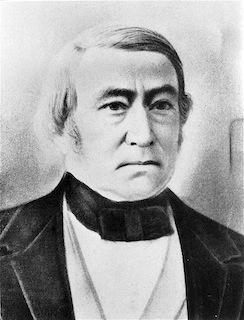
Thomas Fitzpatrick
Fitzpatrick was Freemont's guide for
these expeditions, and Freemont's reports were widely publicized by
his father-in-law, Thomas Hart Benton, the bombastic booster of
expansionism from Missouri.
Like Benton,
the future president James Polk was a committed expansionist who
pledged to both secure for the United States exclusive title to
Oregon and Texas, and to acquire California from Mexico.
Polk, a man who had never been west of the Mississippi river, was
as determined as Benton to settle the West with Americans and to
'bring the entire continent under the wings of the eagle.'
The
expansionists' top priority was a passageway for safe migration
through Indian country. In December 1845, Polk
recommended to Congress that "a suitable number of stockades and
block house forts be erected along the usual route between our
frontier settlement on the Missouri and the Rocky Mountains, and
that an adequate force of mounted riflemen be raised to guard and
protect them on their journey."
On
May 19, 1846, Congress authorized the Oregon Trail Act to fund the
building for the forts, a decision strongly opposed by Thomas
Fitzpatrick, who believed such forts could only provoke hostilities
while accomplishing little in the way of protecting citizens.
Related People
Related Events
Related Flashpoints